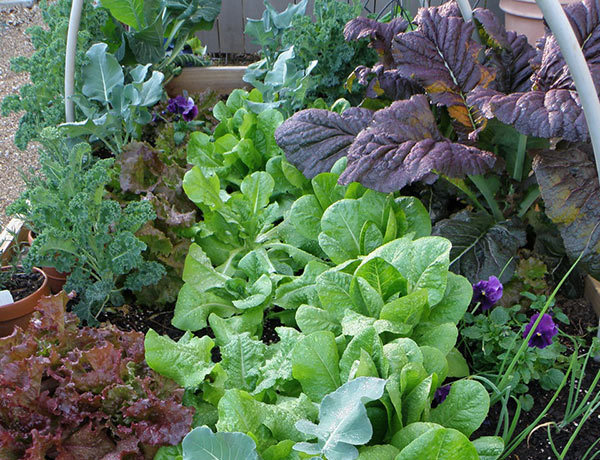
As the summer vegetables go into the garden, place the plants so that their pest insects have a hard time finding them. Yep, rotate their position from year to year and interplant!
Vegetables from the same crop group have similar disease and pest problems. The rotation minimizes diseases and pests that are attracted to that group. Follows is a list of crop groups:
• Cantaloupe, cucumber, pumpkin, squash and watermelon are one group.
• Group B is comprised of Brussels sprouts, cabbage, cauliflower, collards, lettuce, mustard, radish, rutabaga, spinach, Swiss chard and turnip.
• Eggplant, Irish potatoes, okra, pepper and tomatoes are similar.
• Beets, carrots, garlic, shallot and sweet potatoes comprise Group D.
• Sweet corn is in its own group.
• The final group is comprised of beans, cowpeas and peas.
For this season, place plants from a crop group in the location where plants from another crop group grew last year. Example: where pumpkins grew last year, now plant with tomatoes.
Interplanting is raising two or more crops in the same area at the same time. The growth of each does not interfere with the other; in fact, it often is beneficial. Insects are deterred from interplanted vegetables; they prefer rows of the same crop. The spread of disease is also slowed down.
Try these ways to intercrop (interplant):
• Grow vertically when possible with squash, beans, cucumbers, peas, melons and tomatoes. Large fruits can be supported with mesh slings. Growing upward frees space at the base of the plants for another crop.
• Insert narrow leaf vegetables such as onions and leeks between leafy vegetables like kale or lettuce.
• Taller, sun-loving plants can extend the growing season of beans, beets, chard, leeks, lettuce, peas, radishes and turnips. The shade of the taller plants will extend the season of the cooler-season crops.
• Plants that have large structures or leaves provide shelter for vines, such as beans.
• Small, fast-growing vegetables like radish and lettuce can be planted near tomatoes and peppers. The tomatoes and peppers will grow large enough to need their space, too, but not until after the small ones are finished producing.
Here is a list of intercropping combinations:
Asparagus – Tomato, parsley and basil
Bush beans – Potato, cucumber and corn
Cabbage (Cole) – aromatic herbs, celery, beets, onion family, chamomile, spinach and chard
Carrots – radishes, lettuce, rosemary, onion, sage and tomato
Corn – potato, beans, pumpkin, cucumber and squash
Eggplant – Beans and marigold
Lettuce – carrots, radish, strawberry and cucumber
Onion (Allium) – beets, carrots, lettuce and cole family
Parsley – tomato and asparagus
Pole beans – corn and radish
Potato – beans, corn, cole family, marigolds and horseradish
Pumpkins – beans, corn and marigold
Radish – carrots, nasturtiums, lettuce and cucumber
Spinach – beans
Squash – nasturtiums, corn and marigold
Tomato – onion family, nasturtiums, marigold, asparagus, carrots, parsley and cucumber
Turnip – aromatic herbs, celery, beets, onion family, chamomile, spinach and chard
Plant corn earlier in the planting season. Pests do more damage to the corn planted late in the season.
A 2–3 inch layer of organic mulch can conserve water, regulate soil temperature and suppress pest problems. Mulching is always a good idea.
 2015 Rutherford County Farmers Market Class Schedule
2015 Rutherford County Farmers Market Class Schedule
The Farmers’ Market opens at 7 a.m. on Friday, May 8. It will be open Tuesdays and Fridays through October. Only locally grown produce and wares are sold until noon. Credit, debit and EBT are accepted. The Market is located in the Community Center at the Lane Agri-Park, 315 John R. Rice Blvd., Murfreesboro.
Free classes will be held at the Community Center on Tuesdays and Fridays. Classes begin at 9 a.m., and will be taught by Extension Agents, Certified Master Gardeners (CMGs) and special guests. Occasionally there may be a small fee to cover materials for hands-on projects.
May 8 – Mark Murphy, CMG: Grow Your Own Cornbread
Enjoy growing grain corn in your garden and converting it to meal for cornbread and grits.
May 12 – Richard Lee, CMG: Local Treasures, Middle Tennessee Native Plants
Use environmentally responsible and wildlife-friendly native plants as valuable additions to your home landscape.
May 15 – Floyd Adams, CMG: Mushroom Gardening
Learn to grow your own bed of mushrooms at home.
May 19 – Jane McNulty: Music for Everyone
Learn how to use music to feel better, exercise your brain and decrease stress.
May 22 – Linda Stevens, CMG: Deciphering Food Nutritional Labels
Confused by all of the info on food packaging these days? We’ll help you decode and make the best choices for your family.
May 26 – Carla Bush, Ext. Agent: Seasonal Eating, Egg Cookery
Get your EGGucation about the amazing versatile egg.
May 29 – Mitchell Mote, Ext. Agent: All Brown Patches Are Not Brown Patch
Discussion of common lawn problems and what to do about them.
June 2 – Ken Roberge, CMG: Gardening Apps for your Smart Phone
Review of useful apps that may aid in the identification and treatment of common residential plant problems.
June 5 – Frank Crawford, CMG: Raised Bed Gardening
We’ll discuss the many benefits, various types and raised bed construction methods, as well as site requirements and plant suggestions.
Please contact Janie Becker at jbecker8@utk.edu or (615) 898-7710 for further information or questions on the farmers’ market or the education series.












